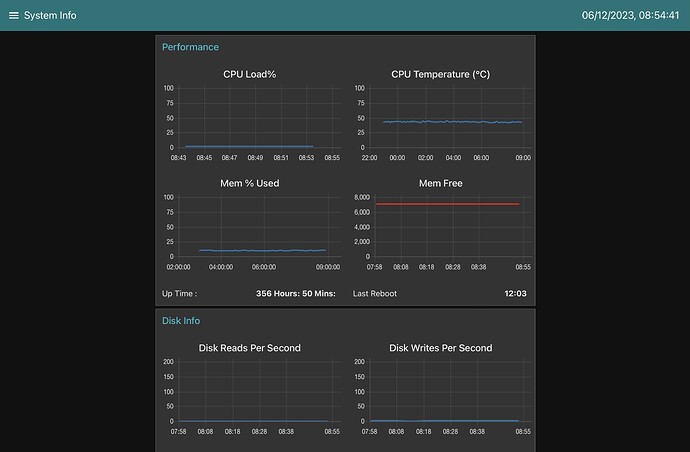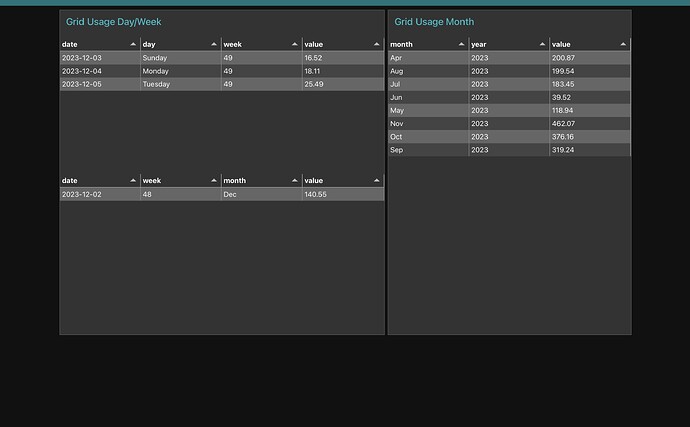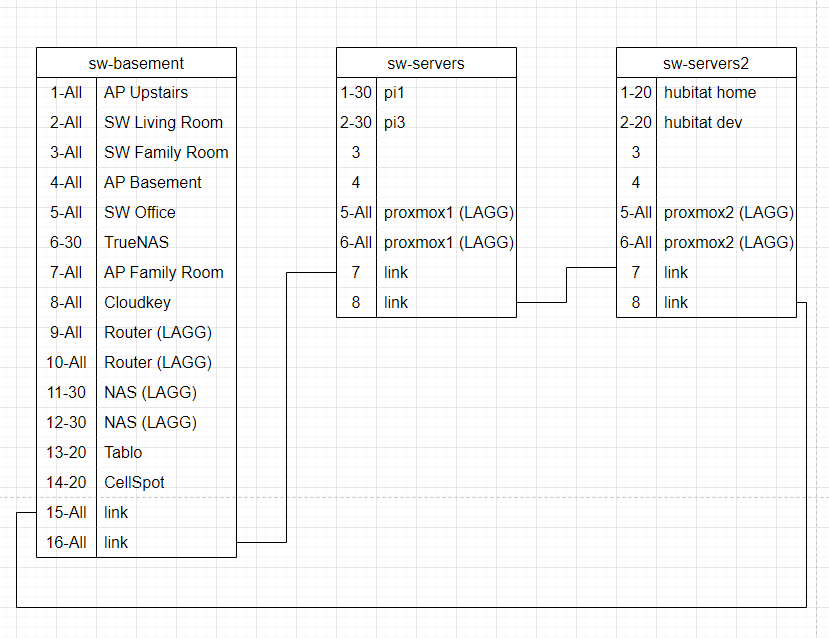Lately, I have been considering branching out a bit in how I do things. In the past, i have been hesitant to go down the Rpi road as I don't have a lot of space for many adapters, and just don't want to have several of these lying around junking up the place. Would it be conceivable to use a mini pc similarly, but maybe be able to put multiple integrations on one, vs . several Rpi's? off the top of my head, I'm thinking ing this like possibly home assistant, and node-red. I'm sure there are others. Almost thinking of using it almost as a mini server of sorts. Is this a possibility? or am I totally lost in my thinking?
I have a number of rPi which are ‘lying around’ doing things like a ‘gps time server’ and a few other jobs
However, my main 8gb rPi runs: node red, mosquito & zigbee2mqtt and this runs my whole home automation system.
My remaining Hubitat runs a couple of legacy z-wave devices and a couple of ‘net integrations.
I use an mqtt app on my Hubitat to pass control of these devices to node-red
I don’t run docker, although you could easily if you wanted to separate your systems
Yes, you could easily run a small, more powerful pc with some form of virtualisation platform to do the same job but it really isn’t necessary as the rPi would do it all
As a matter of interest, I have around 180 devices (mostly zigbee now) which run perfectly via a usb dongle.
The rPi is probably over specced for the work I am asking of it……
Andy
Hey, hadn't seen you around in a while! Hope you are doing well!
Maybe I was under the wrong impression. I have always thought you needed a separate Rpi for each thing you wanted to do. I take it that's not the case? Another use case I am considering is experimenting with Twingate (rather than VPN) for remote access. This is all coming hand in hand with a couple of other projects I'm embarking upon, one of which is to try and educate myself better in the area of networking and Cyber security, This is the goal of developing a skill stack that could be a side gig, or even second income when I retire from my current position in a few years. Also, I just generally feel the need to get my brain engaged and challenged more lately.
I’m ok now it seems thanks
(Had a stroke & another heart attack so gave everything up for a year)
This is my first post for a long time ![]()
As you can see from the screenshot I posted, my main rPi is not stressed at all
In fact I could probably swap it out for one a quarter of the size.
I have never used ‘docker’ but believe it will get you ‘containers’ to put apps etc into so you can separate things if you really want to.
Tbh, I just run everything natively but remember, an rPi is just a small box running linux so in theory it could run any linux based virtualisation platform you want.
I quickly looked at twingate and it doesn’t seem to require much in resources once installed so you could probably run it all together in one box
One thing I do like to do is run a separate rPi as a ‘test’ machine before installing on my main rPi
If , after trying on my test box, everything runs ok, then after a backup of the main rPi, I will install and configure again on my main rPi
This way my system has been stable for a couple of years now and all I really do is change device batteries. ![]()
I forgot to mention, I also run sqlite on this box so have the ability to create as many databases as I want
This is a dashboard that I created to document my power usage…
This is just reading from an sql db
(I really should get around to changing ‘value’ to kwh ![]() )
)
The other thing I should mention is that I don’t use an sd card for storage - This rPi has an ssd hard drive installed (about 250gb I think)
Welcome back, Andy! Glad to hear you’ve recovered and are doing well!
Hi
Not exactly ‘back’ but doing well thanks
I run Home Assistant Operating System (HAOS) on my HA Yellow PoE hub. I added my own 8GB RPi CM4 module plus a 1TB NVME SSD.
HAOS makes running things like Node-RED, InfluxDB, and Grafana very easy via its built-in ‘Addons’. I use this to collect data from multiple HE hubs to monitor performance.
The HA Addons are prepackaged containers, that have already been tested and are trivial to deploy and maintain.
I also use HA to bring in a few devices to HE via the HADB integration. Works great for my Aqara FP2 sensor, for example.
You do not need a HA Yellow though. Any RPi 4 will do. Just get one with at least 4GB of RAM. The HA team is working on support for the new RPi 5 as well.
Good to see you back, I have moved to mini pc's running Proxmox for most of my homelab now. I still have two dedicated Pi's to GPS Time Services but everything else I moved off my Synology NAS and Pi's to the Proxmox two node cluster for redundancy. I found the Beelink EQ12 services with N100 Alder Lake, 16GB mem, 500GB SSD along with two 2.5 GB ethernet adapters seems more robust than trying to keep a pool of Pi's and Docker running. To keep quorum, I use one of my GPS pi's to run as the virtual 3rd node in the cluster.
Right now I have the following running in the cluster:
- Bitwarden
- Redundant PiHole's
- Weewx
- Nginx Proxy
- Graphana
- InfluxDB
- Graylog Log Server
- Wireguard VPN
- and about 5 other test containers for experimenting with large language models.
Have fun engineering your solution.
Great to see the Cobra Union Jack avatar back.
Another alternative is to run this stuff on a NAS. Everyone should have a NAS anyway. Make sure it can run VMs as well as Docker. Home Assistant works better in a VM.
That is in the long range plan. Just not at the top of the list at this point in time. Partially because I need to learn more about them. Partially because of cost.
You could put multiple integrations on either I think.
I ended up getting a used business class mini-PC and it works great. I started out with DietPi running in a VM (on top of windows). Eventually I need to just move it fully over to Ubuntu server or something similar I think (getting rid of windows).
I think the question is what are yourshort term and long term goals and do you want what you get now to be part of that long term solution.
I have a Unraid server/NAS. You can run unraid on pretty much anything. There are allot of good older sytsems out there that will make a decent Unraid server depending on your wants and needed. If you don't mind the larger form factor pretty much desktop hardware within the last few years that would be recycled will be more powerful then a raspberry Pi and more flexiable
That said you could also take this CWWK Mini PC/Firewall i got and run it as a nas. It has a way to house 5 NVME drives so unless you need an absolute monster amount of storage it could do it well as well.
One additional thing to consider is how much energy you want to be using as well. RPis are great because they are low power. MiniPCs/NAS hardware take quite a bit more.
In my case, I have two rackmount servers running Unraid w/ 24 dockers, Proxmox with 7 containers and HA as a VM. Everything works well and I don't ever worry about resources, but I wince every time I look at my power bill.
If you can run everything you need on an RPi, you won't even notice the power use. That said, I would run it off of an SSD vs an SD card so that you don't have to worry about media failure.
Great to hear things are a little smoother for you now! You've been missed...
I also run multiple integrations on RPi's, each Pi has two or three things going. You can even set up Home Assistant such that you can run it alongside other integrations using a specific install type (IIRC called Home Assistant Supervised) if you don't want to dedicate one Pi to just running HA. There are a ton of "recipes" out there on the web to help you get things set up, and once you have a Pi or two you will find ways to use them. They are very low power consumption, so that's good too.
I have gone the Mini PC route, I have a few Lenovo M9X series running things here vice the Rpi.
One runs PFSense for home router/firewall, the second HAOS and the third is my lab box with Proxmox on it and the stuff I tinker with. I did it that way so that I had stable units running the important features in the house while I could experiment on the other and bring it up and down as often as I like. I got them for about $150.00 each off of ebay. They are never over tasked and sip power.
My one Raspberry Pi 4 runs a lot of things without much load, and the new Pi 5 has even more processing power. My pi does:
- Runs several ADSB receiver programs, decoding data from a radio receiver and sending results to several ADSB data providers, tracking multiple aircraft on a second by second basis.
- Runs NUT, monitoring my UPS and notifying other devices, including hubitat, of issues.
- Node-Red
- Mail server, also acting as relay for the hubitat, since hubitat can’t use secure servers such as google.
- Login server for “echo speaks” integration.
- LAN firewall log monitor, sending info on intrusion attempts.
- Collects and archives hubitat database backups.
- VPN server (Wireguard).
Probably more things as well.




